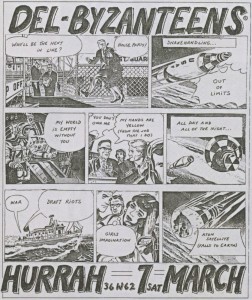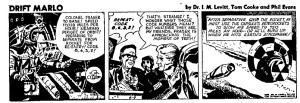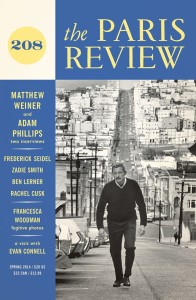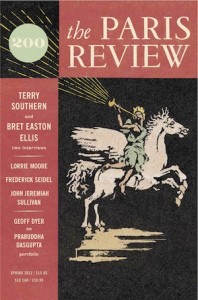Follow Scott
Recent Tweets
- Waiting for Twitter... Once Twitter is ready they will display my Tweets again.
Latest Photos
Search
Tags
anniversary Balticon birthdays Bryan Voltaggio Capclave comics Cons context-free comic book panel conventions DC Comics dreams Eating the Fantastic food garden horror Irene Vartanoff Len Wein Man v. Food Marie Severin Marvel Comics My Father my writing Nebula Awards Next restaurant obituaries old magazines Paris Review Readercon rejection slips San Diego Comic-Con Scarecrow science fiction Science Fiction Age Sharon Moody Stan Lee Stoker Awards StokerCon Superman ukulele Video Why Not Say What Happened Worldcon World Fantasy Convention World Horror Convention zombies
©2025 Scott Edelman
The Paris Review—to which I’ve had a lifetime subscription since the late ’70s—has provided me with yet another comics-related mystery. Over the years, they’ve published many collages which have used comics imagery, such as this one, by poet John Ashbery, which incorporated one of the most famous faces of all and so was immediately identifiable by me, and this, by an artist known as Jess, for which I needed help tracking down the original source.
In the current Spring 2016 issue, to accompany an interview with Luc Sante, the magazine published a flyer the writer had created in 1980 promoting a gig by the band the Del-Byzanteens. As you can see below, the promo repurposed panels from comics which seem to me to have the feel of comic strips rather than comics books, though I might be wrong about that, and I could instead be perceiving the style difference between UK and U.S. comics.
Of course, I could easily be wrong about it all.
Take a look and tell me what you think.
So?
I have no idea who the original artist might be here. Do you?
UPDATE: Well, that was fast!
Sean Howe, author of the wonderful Marvel Comics: The Untold Story as well as the upcoming Agents of Chaos (about the founder of High Times) reached out directly to Sante—because Sean knows everyone—and was told:
They’re from a stack of promotional offprints I found when I was working at the Strand, aimed at newspapers and syndicates, for a strip called “Drift Marlo,” by Tom Cooke. Never having seen the strip anywhere else, I’d always assumed it had gone nowhere, but I was wrong …
Sante also provided a link to an entry on Ger Apeldoorn’s blog which included some of the strips from which Sante created his flyer. Including this one, the center panel of which provided the central panel above.
Mystery solved! Thanks, guys!
I was reading the latest issue in my lifetime subscription to The Paris Review today—a gift subscription from my wife that’s been going on for more than 35 years (so I got that going for me, which is nice)—and because the interviews have always been my favorite part, I started by reading the first one, which is with Hilary Mantel, best known as the author of Wolf Hall.
One of the things she had to say about her approach to writing resonated with my own—
With historical fiction, the big thing is the constant check you keep on information. What have I told my readers? Of what I’ve told them, how much do I think they hang on to, at first reading? Have I told them too much, have I spoon-fed them? Or have I told them too little, mystified them? It’s not just historical fiction, of course, all fiction is like that. And if it’s a choice between spoon-feeding and mystification, I think choose mystification, because you always have to assume that your reader is at least as intelligent as you are, if not more so.
Between the two, I, too, choose mystification.
How’s that working for me?
Well … it’s working for me.
As to whether it’s working for anyone else … that’s a question which has yet to be fully answered.
Why my writing is both immaculate and fallible
Posted by: Scott
Tags:
Paris Review
Posted date:
December 28, 2014 |
No comment
It’s been such a busy year that I fell behind in my reading of The Paris Review, to which I was given a lifetime subscription by my wife in 1979. (I wonder how long that subscription will last?) But I’ve been binge-reading the magazine this week, so I just caught up with in the Adam Phillips interview in the the Spring 2014 issue.
I’d never heard of Phillips, I’m embarrassed to say, but that doesn’t mean the interview wasn’t interesting, as all Paris Review interviews are.
Here’s the passage that stood out for me the most— (more…)
Another comic strip mystery
Posted by: Scott
Tags:
comics, Paris Review, Publishers Weekly
Posted date:
September 16, 2012 |
2 Comments
The universe must really want me to tell you about the collage artist born Burgess Franklin Collins, who became known as, simply, Jess. And who am I to deny doing want the universe wants?
First, while reading the latest issue of the Paris Review, I came across a collage the artist had done in 1956 that made use of comics—and you already know how intrigued I am by collages like that.
Then (I assume because I wasn’t acting quickly enough), up popped a Publishers Weekly review of the book Jess: O! Tricky Cad and Other Jessoterica, which told me more about the former Manhattan Project radiochemist turned artist and informed me that the book’s “publication coincides with the beginning of a traveling exhibition of his work set for 2013 and 2014.”
So I guess I’d better share the image which intrigued me so, or else mentions of Jess will inevitably start creeping into every magazine I read! (more…)
Here, from playwright and actor Wallace Shawn, is a sentiment you might find … inconceivable.
When I think about my own case, I don’t think of writing as a professional skill. I think of it as an odd thing that I feel an impulse to do. You eat chocolate because you feel a desire to do it. You don’t develop a technique for doing it. You don’t get better at it. And I don’t want to think of writing as a skill I have that I habitually exercise according to a certain schedule of procedures. If it had to be that, I’d possibly feel that I’d rather not to it. Actually, I find the idea of writing as a professional skill somewhat sickening.
I’m not religious, but wouldn’t a religious person find something sickening about it if he were asked to think of meditation, prayer, or adoration of the universe as professionalized skills for which a method could be codified? I guess I am halfway between saying that writing is too personal, intimate, humiliating, and miniscule to discuss and saying it’s too sacred and vast to discuss. And I don’t like to think of it as a thing I do the same way again and again. Who says one instance of writing has anything in common with another instance?
(from an interview in The Paris Review #201)
The 200th issue of the Paris Review features an interview with Terry Southern (who, among many other things, wrote the screenplay for Dr. Strangelove) that’s been in the works for 35 years. Southern was interviewed in 1967, but never got around to approving the transcript, and since the magazine allows its interviewees that privilege, it never saw print.
The interview has only recently been discovered, and I find these thoughts of Southern’s prescient:
In five years television screens will be half the size of a movie screen, they’ll occupy a whole wall. And people will just sit there. They’re not going to leave the house except to see something groovy, something that they can’t see at home.
The great future, not for creative writers, but for professional writers, is in television, because pay television is going to come in, and that will take the place of the art movies that exist now, and ordinary television will take the place of what now exists in movies. In twenty years, the movies that compete with TV and pay TV will have to be pretty far out. Otherwise people will simply hang with the tube.
So not only did he foresee the coming age of quality pay television—with Breaking Bad, Mad Men, and the like—but also the massive screens on which we’d watch them all.
I ran across two intriguing quotes over the past couple of days that have absolutely nothing in common and have no right to be rubbing up against each other like this. But here they are anyway, and make of them what you will.
First, Philip Kennicott, reviewing (well, eviscerating) “The Art of Video Games” exhibition at the Smithsonian American Art Museum for the Washington Post, wrote:
What must a game do to become art? And when will the medium itself begin to look more like the art world than the entertainment industry?
I’d propose some of the following: We’ll know it’s art when old games are as interesting to people as new ones; when particular games play a role in changing the actual world, just as novels such as The Sorrows of Young Werther, Uncle Tom’s Cabin and The Jungle altered ideas of identity and politics; when the best games are richly self-referential to an accepted canon of classic games; and when the contemplation after playing a game is more pleasing than the game itself.
Which to me says more about the fact that the Post should have sent someone else to review the exhibition than it does about the exhibition itself. (more…)
Kudos to the editors of The Paris Review for including an interview with R. Crumb in their Summer 2010 issue. That magazine has published interviews with writers and poets since it began, but this is the first time it has ever featured an interview with a comics creator.
I’m not so happy that the interviewer described Crumb as “perhaps the most influential cartoonist of his or any generation,” since, even though he’s a great talent, I wouldn’t consider him the most influential. There are many other candidates for that position. No Joe Shuster, no superheroes. No Jack Kirby, no Marvel Universe. And as Cortney Skinner just pointed out to me, can you imagine a world with no Walt Disney?
But that wasn’t what so horrified me I felt compelled to set the issue down and come tell you about it. No, what disturbed me was one of the things Crumb had to say in answer to a question about which art supplies he uses. His response caused smoke to erupt from my ears and nostrils, and I had to stop and vent.
When asked what kind of paper he used, Crumb said:
Well, I use the old Strathmore vellum surface paper, which is the best paper you can get in the Western world for ink line drawing. It has a good, hard surface. I have it mailed from the New York Central Art Supply in New York. For a while I was using this old Strathmore paper from fifty years ago that some guy sent me, it had bad comic art on one side, hacked-out comic work from 1959, 1960, but the paper is superior to anything you can get now. It just holds the ink better. I ran out of that and now I use this new stuff that’s not quite as good.
I don’t often go WTF, but Crumb—WTF? Say it ain’t so!
Alas, I fear that it is.
Can any Crumb experts out there attest to validity of this statement? And—assuming it’s true—can you let the rest of us know what original mainstream comics artwork is now hidden on the flipside of Crumb drawings?
Oh, the humanity!
And What is Wrong With a Second-Rate Writer?
Posted by: Scott
Tags:
Paris Review
Posted date:
April 22, 2010 |
No comment
In addition to the Ray Bradbury interview I already told you about, the Spring 2010 issue of The Paris Review also contains an interview with Pulitzer Prize-winning non-fiction writer John McPhee.
Over the course of his lengthy interview, McPhee, a longtime writer for The New Yorker, offered up two anecdotes I particularly liked.
First came one that shines a spotlight on the choices those of us who are both writers and editors must make:
Bingham had been a writer-reporter at The Reporter magazine. So he comes to work at The New Yorker, to be a fact editor. Within the first two years there, he goes out to lunch with his old high-school friend Gore Vidal. And Gore says, What are you doing as an editor, Bobby? What happened to Bob Bingham the writer? And Bingham says, Well, I decided that I would rather be a first-rate editor than a second-rate writer. And Gore Vidal draws himself up and says, And what is wrong with a second-rate writer?
Not at all a retort I would have expected out of Gore Vidal, whose ego seemed such that I’m surprised the phrase “second-rate” was in his vocabulary.
Then came an interesting metaphor relating to style over content, and polish over substance:
I got my thirty thousand words done, and then I finished the thing over Christmas. It has a really good structure and was technically fine. But it had no life in it at all. One person wrote a note on it that said, You demonstrated you know how to saddle a horse. Now go find the horse.
You’ll have to excuse me now. I think I’d better go find a horse.
The Spring 2010 issue of The Paris Review contains an interview with Ray Bradbury that we all should have gotten a chance to read 30+ years ago. (That’s me and Ray below at the 2009 San Diego Comic-Con International.)
Why has this interview gone unpublished until now? Because George Plimpton, editor of the magazine in the late 1970s, declared it to be “a bit informal in places, maybe overly enthusiastic.” Now that the transcribed interview has been rediscovered in Bradbury’s files, the magazine has rectified its error by talking further with Bradbury and bringing the piece up to date. (Which feels a bit odd; since the sections are undated, we have no idea when we’re reading 1970s’ Bradbury vs. 2010 Bradbury.)
As happy as I am to finally see the interview in print (and here’s a brief excerpt of it), it still irks me a bit to see the conversation organized, whether the exchange occurred that way originally or not, so that the magazine starts off by challenging Bradbury to defend his love of SF.
Here are the first two questions and answers: (more…)





